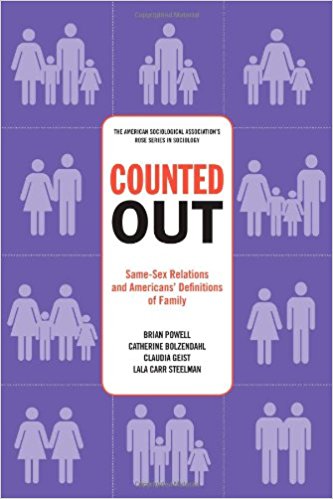Sociology researcher Brian Powell has done some very interesting research about how today’s Americans define family. Results in the book Counted Out examine how men and women of different ages, races, religions, and socioeconomic backgrounds view what constitutes a “family” and what doesn’t.
It looks at married and unmarried couples, heterosexual and same-sex couples, and couples with kids and without. On the kid/no kid front, of course my opinion is inherent in the title of my book, Families of Two! And the childfree agree. But what does the general population think?
In Powell’s study, 100% of those surveyed thought a married heterosexual couple with kids was a family. No surprise. 83% considered unmarried heterosexual couples with kids to be a family, and 64% would say that same-sex couples with kids are a family.
But with no kids: 92% thought that a married, heterosexual couple without kids was a family. Only 40% considered unmarried, heterosexual couples with no kids a family. And only 33% thought that same-sex couples without kids were a family.
On one hand, it is nice news that almost all surveyed see married couples without children as a family. The 8% are traditionalists who remain stuck on the idea that you aren’t a family unless you create offspring. On the other, the opinions seem to reflect that being married and straight are strong factors that influence how people define family. As a society we need to work on that.
Formal definitions of family need some reworking too. Take dictionary.com’s first definition: “a basic social unit consisting of parents and their children;” and “a social unit consisting of one or more adults together with the children they care for.” Fifteen definitions follow—none get at the idea of a social unit consisting of two adults in a committed and/or marital relationship without offspring.
In a New York Times article about the research, David Blankenhorn, president of the Institute for American Values, says he likes the standard definition of family: “two or more persons related by blood, marriage or adoption.” This definition “keeps it simple and coherent.”
How would you write the definition of family?
**********
Update: Postscript on my previous Algorithm post–watch: since this post has the word “family” in it, watch the google ads at the bottom–parent this parent that–it is maddening! Google supposedly released a tool to deal with this– not.
Double postscript: child-centric algorithms persisted to the point where I just decided to blow off google ads altogether!


I guess we can forget about single people (like me) living alone (no kids) being considered a family.
I have a mailing address like multi-person households do. I pay taxes (including school taxes) like multi-person households do. I have household chores like multi-person households do.
But I am not considered a family?
I would say according to sociologists and the “general” public–no…
You are part of a family with your parents. If you really want to stretch it, you can say you’re a family with you’re friends. But really, there has to be a line somewhere, or the word loses all meaning. Family is, by definition, a group noun, and it’s difficult to be a social group by yourself.
I actually just wrote a complaint to a fertility clinic whose radio ads say that they “turn couples into families”.
Thanks, Laura, for leading me back to this post. Generally good news, though I’m still fascinated with the underlying assumptions and resistance to change that childfree couples become accustomed to in explaining/justifying their lifestyle choices. In my post, I looked at the etymology of the word “family” and was simultaneously surprised and fascinated with early usage of the word including servants in the definition. I suspect that by most peoples’ 21st century perspective most of us do not have servants, much less consider them part of our families. Maybe my perspective is unusual? And I believe that the definition has also evolved away from the notion that a family cohabits a household. My siblings and I shipped out to boarding school rather young, but we certainly didn’t consider ourselves less a family.
I encourage us to amplify the idea of family to celebrate — as inclusively as practical — those who create and nurture this fundamental social unit. I challenge the language police to craft a definition of “family” that embodies the very essence of union rather than division! “We are fam-i-ly…”
Hi virtualDavis! Thanks for the great thoughts. The later generations of the word “family” went to pushing its direct tie to procreation and marriage (which I dissect in The Baby Matrix), more recently, the pronatalist perfect “nuclear” – family of four, gotta have the boy and a girl. I am happy to see that more people see there are more ways to define family these days. And with same sex couple marriage rights gaining acceptance, maybe the perspective of same sex couples as “family” is being seen more favorably as well. So many “families” are non-blood related family of friends that are bound like blood from the perspective that they are committed to their relationship, whether it be as intimate partner, dear friend, or who they are caring for (until they can on their own) — to the end. I talk with so many people that when it comes down to it, define their “family” as consisting of those they are going to be there for til their last days…